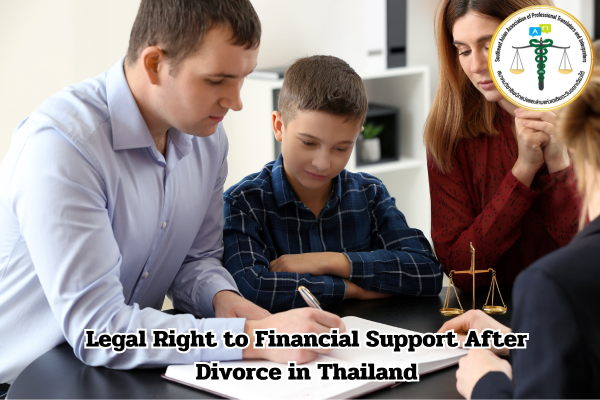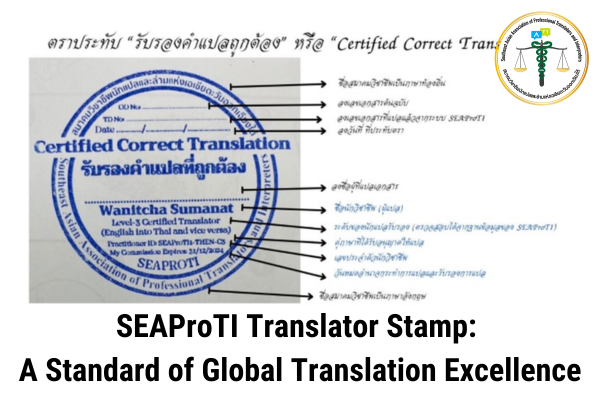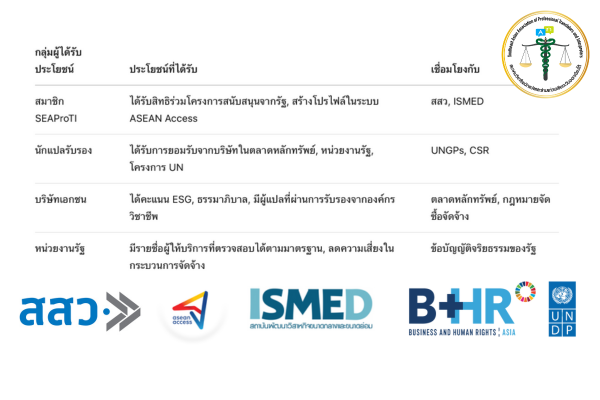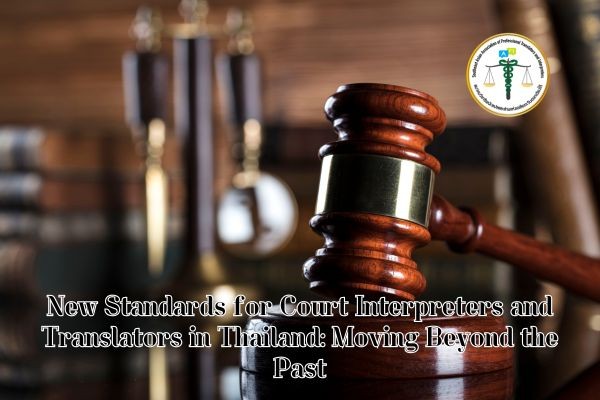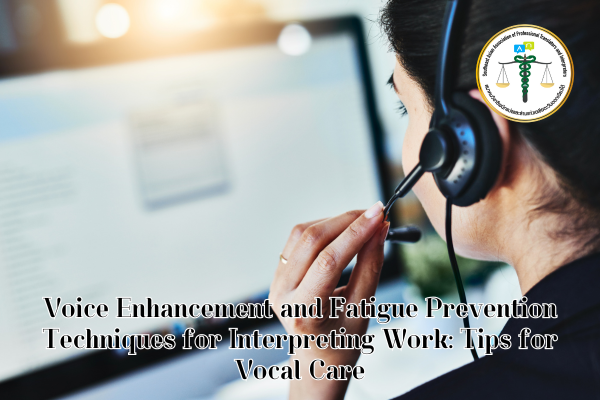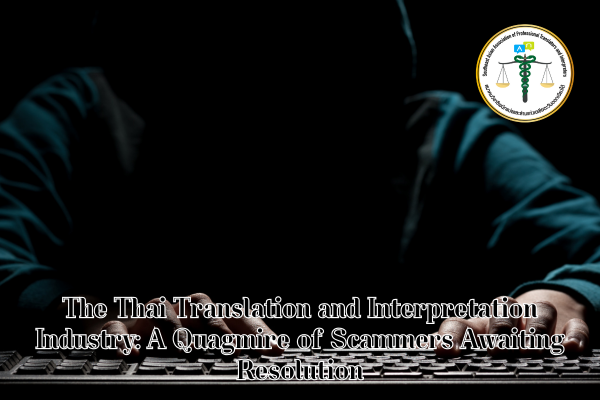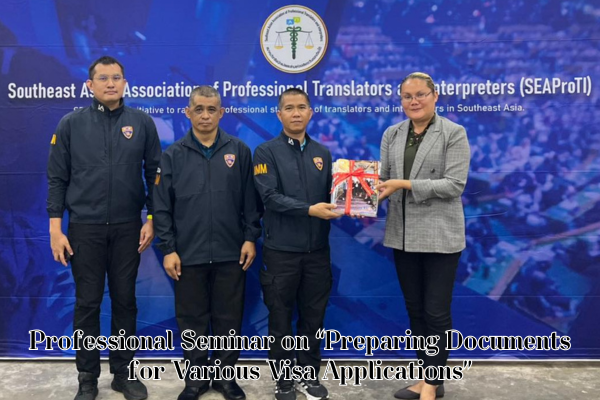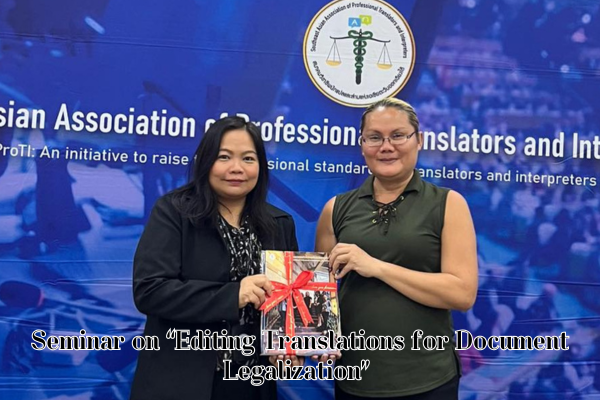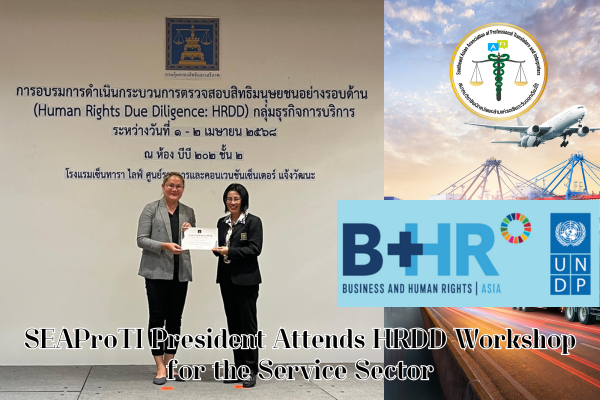Property Ownership through a Thai Spouse and the Role of Certified Translators in the Process
7 February 2025, Bangkok – Many foreign nationals living in Thailand are married to Thai spouses and wish to purchase property, including real estate, such as homes or condominiums. For foreign nationals who hold long-term visas, buying property may seem like an achievable goal. One of the common methods foreign nationals consider is purchasing property through their Thai spouse. However, many believe that property purchased during the marriage is jointly owned, but the legal realities are more complex.
Property Ownership in Thailand
One of the main legal restrictions that foreign nationals need to understand is that foreigners are not allowed to co-own land in Thailand, even if it is through their Thai spouse. The Land Department does not allow a Thai national to register the property under their name if they cannot prove that the land was purchased using the Thai national’s personal assets. This typically involves a joint declaration between the foreign national and the Thai spouse, where it is clearly stated that the land was bought with the Thai spouse’s separate funds.
As a result, the foreign spouse will have no claim to the property. The Thai spouse has full rights to sell, mortgage, transfer, or exchange the property without the consent of the foreign national. The land remains the separate property of the Thai spouse. However, if there is a building or a house constructed on the land, that may be considered joint property, depending on the circumstances and agreements made between the spouses.
Purchasing a Condominium in Thailand
Foreign nationals can buy a condominium in Thailand, but there are limitations. A condominium can be sold to a foreign national as long as the foreign ownership in the building does not exceed 49% of the total development. If a condo unit is purchased by a Thai national married to a foreign national, the condo unit will be considered foreign-owned. However, if the Thai spouse declares that the funds used for the purchase came from their separate property, the condominium will be considered Thai-owned.
The issue with purchasing real estate through a Thai spouse arises if the couple divorces. In such cases, the real estate may be considered the separate property of the Thai spouse. If the foreign national attempts to claim that the funds used to purchase the real estate came from their separate assets, they could risk criminal charges for submitting false statements to a government official. An experienced Thai family lawyer may be able to argue otherwise in court, but this requires professional legal guidance.
The Role of Certified Translators and Interpreters
One critical aspect of purchasing property in Thailand through a Thai spouse involves translating legal documents correctly. Misinterpreted documents can cause misunderstandings and lead to legal problems in the future. This is especially true for documents such as joint declarations, where the source of funds for purchasing property is disclosed.
In this scenario, certified translators from the Southeast Asian Association of Professional Translators and Interpreters (SEAProTI) play a vital role in providing accurate translations of legal documents. They ensure that the documents are translated in a manner that preserves their legal meaning and is acceptable to Thai authorities.
Certified translation experts verify that translated documents are faithful to the original, which is especially important when submitting documents to government authorities or courts. Having a certified translator ensures that no critical details are lost in translation and that the document complies with legal requirements.
Certified interpreters from SEAProTI also play an essential role in facilitating communication between foreign nationals and Thai authorities during legal transactions or when registering property. They help ensure that both parties understand the legal terms and conditions involved in the process.
Potential Pitfalls and Legal Advice
Foreign nationals considering purchasing property through their Thai spouse should be aware of the legal implications surrounding property ownership, especially concerning land and real estate. It is highly recommended to consult with a Thai attorney who specializes in property law to understand all aspects of the transaction and to avoid any potential legal issues down the line.
Additionally, working with certified translators and interpreters from SEAProTI will help ensure that all legal documents and communications are properly handled. This can reduce the risk of mistakes that might lead to legal problems in the future.
Conclusion
Purchasing property in Thailand through a Thai spouse involves navigating legal restrictions, particularly when it comes to land ownership. Foreign nationals should be aware of these limitations and seek proper legal advice to protect their interests. Using certified translators and interpreters from SEAProTI ensures that all documentation and communication are correctly handled, making the process smoother and reducing potential legal risks. Whether it’s translating key legal documents or interpreting in legal settings, the expertise of certified professionals plays a crucial role in ensuring that property transactions in Thailand proceed without complications.
SEAProTI’s certified translators, translation certification providers, and certified interpreters:
The Southeast Asian Association of Professional Translators and Interpreters (SEAProTI) has officially announced the criteria and qualifications for individuals to register as “Certified Translators,” “Translation Certification Providers,” and “Certified Interpreters” under the association’s regulations. These guidelines are detailed in Sections 9 and 10 of the Royal Thai Government Gazette, issued by the Secretariat of the Cabinet under the Office of the Prime Minister of the Kingdom of Thailand, dated July 25, 2024, Volume 141, Part 66 Ng, Page 100.
To read the full publication, visit the Royal Thai Government Gazette
การเป็นเจ้าของอสังหาริมทรัพย์ผ่านคู่สมรสชาวไทยและบทบาทของนักแปลรับรองในการทำธุรกรรม
7 กุมภาพันธ์ 2568, กรุงเทพมหานคร – ในประเทศไทยมีชาวต่างชาติหลายคนที่แต่งงานกับคู่สมรสชาวไทย และหลายคนก็ต้องการซื้อบ้านหรือคอนโดมิเนียมในประเทศไทย โดยเฉพาะอย่างยิ่งหากพวกเขามีวีซ่าระยะยาวและอาศัยอยู่ในประเทศนี้ การที่ชาวต่างชาติเลือกที่จะซื้ออสังหาริมทรัพย์ผ่านคู่สมรสชาวไทยมักเป็นทางเลือกที่ดูสะดวกและง่ายที่สุด แต่จริงๆ แล้ว การทำเช่นนี้มีข้อกำหนดที่ต้องพิจารณาอย่างรอบคอบ เพื่อหลีกเลี่ยงปัญหาทางกฎหมายในอนาคต
การเป็นเจ้าของอสังหาริมทรัพย์ในประเทศไทย
หนึ่งในข้อจำกัดหลักที่ชาวต่างชาติควรรู้คือ ชาวต่างชาติไม่สามารถเป็นเจ้าของที่ดินในประเทศไทยได้ แม้ว่าจะซื้อผ่านคู่สมรสชาวไทยก็ตาม ในกรณีของที่ดิน แผนกที่ดินจะไม่อนุญาตให้จดทะเบียนที่ดินในชื่อของคู่สมรสชาวไทย หากไม่มีหลักฐานว่าเงินที่ใช้ในการซื้อที่ดินนั้นเป็นทรัพย์สินส่วนตัวของคู่สมรสชาวไทย ซึ่งจะต้องมีการยื่นคำประกาศร่วมระหว่างคู่สมรสที่ระบุว่าเงินที่ใช้ซื้อนั้นมาจากทรัพย์สินส่วนตัวของคู่สมรสชาวไทย
ผลจากการยื่นคำประกาศนี้คือ คู่สมรสชาวต่างชาติจะไม่มีสิทธิ์ในที่ดินนั้น ไม่สามารถขาย จำนอง หรือโอนที่ดินได้โดยไม่ได้รับความยินยอมจากคู่สมรสชาวไทย ที่ดินนั้นจะยังคงถือเป็นทรัพย์สินส่วนตัวของคู่สมรสชาวไทย แต่ในกรณีของบ้านหรือสิ่งปลูกสร้างที่สร้างบนที่ดินนั้น อาจถือเป็นทรัพย์สินร่วมกันได้ หากได้รับการตกลงร่วมกันอย่างชัดเจน
การซื้อคอนโดมิเนียมในประเทศไทย
สำหรับการซื้อคอนโดมิเนียมในประเทศไทยนั้น ชาวต่างชาติสามารถซื้อได้ แต่มีข้อจำกัดที่ต้องคำนึงถึง คือ คอนโดมิเนียมในแต่ละโครงการสามารถขายให้กับชาวต่างชาติได้เพียงไม่เกิน 49% ของพื้นที่ทั้งหมดของโครงการ หากคู่สมรสชาวไทยและชาวต่างชาติซื้อคอนโดมิเนียมร่วมกัน โดยชาวไทยใช้เงินส่วนตัวในการซื้อ จะถือว่าเป็นทรัพย์สินของชาวไทย หากคู่สมรสออกคำประกาศร่วมว่าเงินที่ใช้ในการซื้อมาจากทรัพย์สินส่วนตัวของชาวไทย
อย่างไรก็ตาม ปัญหาที่อาจเกิดขึ้นคือ ถ้าหากเกิดการหย่าร้างในอนาคต ทรัพย์สินเหล่านั้นอาจถูกพิจารณาว่าเป็นทรัพย์สินส่วนตัวของคู่สมรสชาวไทย ซึ่งจะทำให้ชาวต่างชาติไม่มีสิทธิ์ในทรัพย์สินดังกล่าว และหากชาวต่างชาติพยายามแถลงว่าทรัพย์สินนั้นมาจากเงินส่วนตัวของตนเอง อาจเสี่ยงต่อการถูกตั้งข้อหาความผิดทางอาญาได้ ดังนั้น การขอคำแนะนำจากทนายความที่มีประสบการณ์ในด้านนี้จึงเป็นเรื่องสำคัญ
บทบาทของนักแปลรับรองและล่ามรับรองในการทำธุรกรรม
ในการซื้ออสังหาริมทรัพย์ในประเทศไทยผ่านคู่สมรสชาวไทย การแปลเอกสารต่าง ๆ เป็นขั้นตอนสำคัญที่ไม่สามารถมองข้ามได้ โดยเฉพาะเอกสารที่ต้องใช้ในการทำธุรกรรมทางกฎหมาย เช่น คำประกาศร่วมที่กล่าวถึงการใช้เงินส่วนตัวในการซื้อที่ดินหรือคอนโดมิเนียม ซึ่งการแปลเอกสารที่ผิดพลาดอาจทำให้เกิดความเข้าใจผิดหรือปัญหาทางกฎหมายในภายหลัง
ในกรณีนี้ นักแปลรับรอง จากสมาคมวิชาชีพนักแปลและล่ามแห่งเอเชียตะวันออกเฉียงใต้ (SEAProTI) มีบทบาทสำคัญในการแปลเอกสารให้ถูกต้องและมีความเป็นทางการ เพื่อให้เอกสารเหล่านั้นได้รับการยอมรับจากหน่วยงานราชการและสามารถนำไปใช้ในกระบวนการทางกฎหมายได้
ผู้รับรองการแปล จะช่วยตรวจสอบและรับรองว่าเอกสารที่แปลนั้นถูกต้องและตรงตามต้นฉบับ โดยเฉพาะในกรณีที่ต้องยื่นเอกสารต่อหน่วยงานของรัฐหรือใช้ในศาล การมีผู้รับรองการแปลที่เชี่ยวชาญจะช่วยให้กระบวนการนี้เป็นไปอย่างราบรื่น
ล่ามรับรอง จาก SEAProTI ก็มีบทบาทสำคัญในการสื่อสารระหว่างชาวต่างชาติและเจ้าหน้าที่ในการดำเนินการทางกฎหมายหรือทำธุรกรรมต่าง ๆ เพื่อให้ทั้งสองฝ่ายสามารถเข้าใจข้อกำหนดและเงื่อนไขต่าง ๆ ได้อย่างถูกต้องและชัดเจน
ข้อควรระวังและคำแนะนำ
หากคุณกำลังพิจารณาซื้ออสังหาริมทรัพย์ผ่านคู่สมรสชาวไทย ควรทำความเข้าใจเกี่ยวกับข้อกำหนดทางกฎหมายให้ชัดเจน โดยเฉพาะเรื่องของการเป็นเจ้าของที่ดินและทรัพย์สินอื่น ๆ ในประเทศไทย นอกจากนี้ยังควรปรึกษาทนายความที่มีความเชี่ยวชาญในด้านนี้เพื่อหลีกเลี่ยงปัญหาที่อาจเกิดขึ้นในอนาคต
การใช้บริการ นักแปลรับรอง และ ล่ามรับรอง จากสมาคม SEAProTI จะช่วยให้กระบวนการต่าง ๆ เป็นไปอย่างถูกต้องตามกฎหมาย ลดความเสี่ยงจากการแปลที่ผิดพลาดหรือความเข้าใจผิดที่อาจเกิดขึ้นระหว่างการสื่อสาร
บทสรุป
การซื้ออสังหาริมทรัพย์ในประเทศไทยผ่านคู่สมรสชาวไทยนั้นมีข้อกำหนดที่ต้องคำนึงถึงหลายประการ โดยเฉพาะในเรื่องของการเป็นเจ้าของที่ดินและสิทธิ์ในทรัพย์สิน การมี นักแปลรับรอง และ ล่ามรับรอง จาก SEAProTI ช่วยให้กระบวนการทุกขั้นตอนเป็นไปอย่างราบรื่นและถูกต้อง ช่วยให้ธุรกรรมทางกฎหมายและการซื้ออสังหาริมทรัพย์ดำเนินไปได้อย่างราบรื่นโดยไม่มีปัญหาทางกฎหมายในภายหลัง
เกี่ยวกับนักแปลรับรอง ผู้รับรองการแปล และล่ามรับรองของสมาคมวิชาชีพนักแปลและล่ามแห่งเอเชียตะวันออกเฉียงใต้
สมาคมวิชาชีพนักแปลและล่ามแห่งเอเชียตะวันออกเฉียงใต้ (SEAProTI) ได้ประกาศหลักเกณฑ์และคุณสมบัติผู้ที่ขึ้นทะเบียนเป็น “นักแปลรับรอง (Certified Translators) และผู้รับรองการแปล (Translation Certification Providers) และล่ามรับรอง (Certified Interpreters)” ของสมาคม หมวดที่ 9 และหมวดที่ 10 ในราชกิจจานุเบกษา ของสำนักเลขาธิการคณะรัฐมนตรี ในสำนักนายกรัฐมนตรี แห่งราชอาณาจักรไทย ลงวันที่ 25 ก.ค. 2567 เล่มที่ 141 ตอนที่ 66 ง หน้า 100 อ่านฉบับเต็มได้ที่: นักแปลรับรอง ผู้รับรองการแปล และล่ามรับรอง



